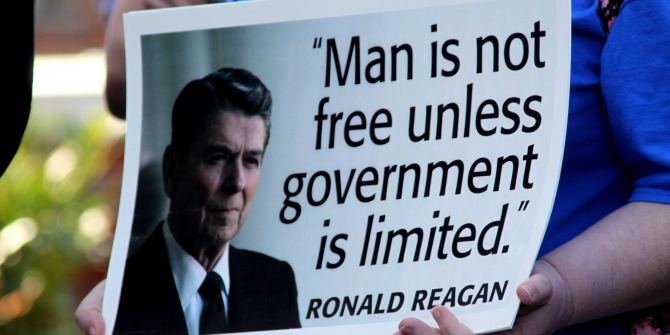
A standard assumption in policy analyses and political debates is that classical liberal or libertarian views represent a radical alternative to a progressive or egalitarian agenda.
In the political arena, classical liberalism and libertarianism often inform the policy agenda of centre-right and far-right parties. They underpin laissez-faire policies and reject any redistributive action, including welfare state provisions and progressive taxation. This is motivated by a fundamental belief in the value of personal autonomy and protection from (unjustified) external interference, including from the state.
It is difficult to overestimate the philosophical and political relevance of classical liberalism and libertarianism. President Trump’s proposal to repeal the “Affordable Care Act (Obamacare)”, for example, is clearly inspired by a libertarian philosophical outlook whereby “No person should be required to buy insurance unless he or she wants to” (Healthcare Reform to Make America Great Again).
More generally, in the last four decades the political consensus, and the spectrum of policy proposals and outcomes, has significantly moved in a less interventionist, more laissez faire direction. The centrality of classical liberal and libertarian views has been such that the historical period after the end of the 1970s – following the election of Margaret Thatcher in the UK and Ronald Reagan in the US – has come to be known as the “Neoliberal era”.
Yet the very coherence of the classical liberal and libertarian view of society, and its consistency with the fundamental tenets of modern democracies, have been questioned. Thanks to the work of Nobel laureate Amartya Sen, for example, it has long been known that classical liberalism and libertarianism may contradict some fundamental democratic principles as they are inconsistent with the principle of unanimity (also known as the Pareto Principle) – the idea that if everyone in society prefers a policy A to a policy B, then the former should be adopted.
In a new study, we have analysed the consistency of classical liberalism and libertarianism in the light of the challenges that modern societies face, such as environmental problems and the allocation of resources between generations. In particular, we have adopted the modern tools of economic analysis in order to provide rigorous answers to the following questions:
- Can liberal views of individual autonomy and freedom provide consistent foundations for social choices?
- And what are the implications of classical liberal and libertarian approaches for distributive justice and economic policies?
To be precise, we study a property – formally, an axiom – capturing a liberal non-interfering view of society, the harm principle, whose roots can be traced back to John Stuart Mill’s classic book On Liberty (1859).
The basic idea of the harm principle is that: ‘The only purpose for which power can be rightfully exercised over any member of a civilised community, against his will, is to prevent harm to others… The only part of the conduct of anyone, for which he is amenable to society, is that which concerns others. In the part which merely concerns himself, his independence is, of right, absolute.’ (John Stuart Mill, On Liberty, Chapter I).
Formally, we translate this intuition as follows: suppose that society chooses policy A – say, a flat tax – over policy B – say, a progressive tax. Suppose next that after this choice, but before the implementation of the policy, your welfare decreases for reasons independent of the policy. Perhaps you have been unlucky and have broken your leg. Or maybe you have been careless and your house has burnt down. Either way, nobody else but you is affected. In this scenario we argue that, in a liberal perspective, if after the decrease in welfare you still prefer policy A (flat tax) to policy B (progressive tax), then society should not switch to a progressive tax.
The principle captures the idea that an agent can veto society from switching choices after a negative change that affects only her and nobody else. A switch in society’s choices against someone after she has incurred a welfare loss would represent a punishment for her which does not yield any benefits to others. This would run directly counter a liberal ethics.
The Harm Principle, as we formalise it, is intuitive and not particularly demanding. For example, it does not impose the adoption of a flat tax in our example: it says that if a flat tax was chosen, then it should still be chosen in the circumstances described. Although it does not outline the boundaries of a complete liberal theory of the state, the Harm Principle does capture some of the core liberal intuitions, and in particular a liberal view of noninterference whenever someone suffers a welfare loss and nobody else is affected. This mild and reasonable principle has some rather startling implications.
We show that, unlike in Amartya Sen’s seminal contribution, classical liberal views of individual autonomy and freedom – as embodied in the harm principle – can provide consistent foundations for collective evaluations, and are consistent with the fundamental democratic principle of unanimity.
In particular, a liberal non-interfering approach can help to adjudicate some fundamental distributive issues, including those related to intergenerational justice. This is a key policy area in the light of current debates on climate change and carbon emissions, and a natural application of the harm principle, which embodies some important aspects of the very idea of sustainability as defined in the United Nations’ Brundtland Report.
Yet, the harm principle has a surprising and counter-intuitive implication when coupled with the principle of unanimity and a basic notion of fairness, known as the principle of Anonymity, – according to which policies should not be ad hominem and be designed independently of individual identities.
We show that, together with Anonymity and the Pareto Principle, the Harm Principle leads straight to the adoption of strongly egalitarian policies – more precisely, policies promoting the equality of welfare among all members of society, as advocated by the American political philosopher John Rawls. In other words, contrary to the received view, classical liberalism and libertarianism do not provide a radical alternative to egalitarianism: rather, this analysis can be interpreted as showing that if one adopts a liberal view of non-interference (and the fundamental democratic principle of unanimity), then one is forced to embrace egalitarian redistributive policies, including progressive taxation and the welfare state.
Some important implications derive for both of the main contending approaches in political philosophy. Our result can be read as suggesting that classical liberals and libertarians need to reconsider the philosophical foundations of their political outlook: if they want to escape the egalitarian implications of our result – without rejecting the fundamental democratic principle of unanimity – then they must reconsider the central role traditionally attributed to John Stuart Mill’s Harm Principle.
Alternatively, and perhaps more provocatively, our results can be seen as shedding new light on the normative foundations of egalitarian principles and progressive politics. For a strong support for redistributive policies derives from a combination of a belief in democratic procedures and a liberal principle of non-interference and individual autonomy. So perhaps our work provides a rigorous, novel justification for the label `liberal egalitarianism’ usually associated with modern approaches to progressive politics.
♣♣♣
Notes:
- This blog post is based on the authors’ paper Liberal Egalitarianism and the Harm Principle, The Economic Journal, November 2016
- The post gives the views of its author, not the position of LSE Business Review or the London School of Economics.
- Featured image credit: Ronald Reagan sign, by Gage Skidmore, under a CC-BY-SA-2.0 licence
- Before commenting, please read our Comment Policy
 Michele Lombardi is a senior lecturer at the Adam Smith Business School of the University of Glasgow. An Italian citizen, he taught at the University of Warwick, University of Surrey and Maastricht University. Michele received his BSc from the University of Foggia in 2002 and also spent time as a Master student at Queen Mary University of London. He completed his Ph.D. in Economics at Queen Mary University of London in 2007. Michele’s research interests include the design of mechanisms for resource allocation (fair allocation) as well as for group decision making (social choice), bounded rationality, psychology and philosophy. He is also interested in experimental works and applications in these areas. Michele has published articles in a number of economic journals such as the Economic Journal, Economic Letters, Economic Theory, International Journal of Game Theory, Journal of Economic Theory, Journal of Mathematical Economics, Mathematical Social Sciences and Social choice and Welfare. He has also acted as a reviewer for more than twenty different journals in economics, game theory, political science and mathematics.
Michele Lombardi is a senior lecturer at the Adam Smith Business School of the University of Glasgow. An Italian citizen, he taught at the University of Warwick, University of Surrey and Maastricht University. Michele received his BSc from the University of Foggia in 2002 and also spent time as a Master student at Queen Mary University of London. He completed his Ph.D. in Economics at Queen Mary University of London in 2007. Michele’s research interests include the design of mechanisms for resource allocation (fair allocation) as well as for group decision making (social choice), bounded rationality, psychology and philosophy. He is also interested in experimental works and applications in these areas. Michele has published articles in a number of economic journals such as the Economic Journal, Economic Letters, Economic Theory, International Journal of Game Theory, Journal of Economic Theory, Journal of Mathematical Economics, Mathematical Social Sciences and Social choice and Welfare. He has also acted as a reviewer for more than twenty different journals in economics, game theory, political science and mathematics.
 Kaname Miyagishima holds a Ph.D. in Economics from Hitotsubashi University. He is an Associate Professor at the Department of Economics, Aoyama Gakuin University. His research interests include topics of axiomatic approach to fair resource allocations and social evaluation criteria. He has published articles in peer-reviewed academic journals such as the Economic Journal, Social Choice and Welfare, Mathematical Social Sciences, and Review of Economic Design.
Kaname Miyagishima holds a Ph.D. in Economics from Hitotsubashi University. He is an Associate Professor at the Department of Economics, Aoyama Gakuin University. His research interests include topics of axiomatic approach to fair resource allocations and social evaluation criteria. He has published articles in peer-reviewed academic journals such as the Economic Journal, Social Choice and Welfare, Mathematical Social Sciences, and Review of Economic Design.

Roberto Veneziani holds a Ph.D. in Economics from LSE. He is Reader in Economics at the School of Economics and Finance, Queen Mary University of London. His research interests include topics of liberal principles of distributive justice, axiomatic exploitation theory, macrodynamic models of growth and distribution, egalitarian principles, distribution of resources between generations, sustainable development, and normative principles in economics. He is also interested in the history of economic thought and in political economy from a mathematical perspective. He has published articles in a number of outlets in economics, political science and philosophy. He has refereed for more than thirty different journals in economics, political science and philosophy. He is a co-founder of the Analytical Economy Workshop, which has met annually since 2007, and an Editor of Metroeconomica, the Journal of Economic Surveys, and the Review of Social Economy.






.Well, what about the Lockean principle that all rights belong to the people and that they loan rights to political leaders and representatives? The point here is that since, under consent of the governed, the people can only loan rights to government in which they possess themselves. Government does not have individual, nor can they create them out of thin air. So, what happens when a government tortures people; where did the state get that right from? For this to happen, citizens must have the right to torture in order for them to grant it to a governmental body. Same goes for taxation. Only if the people can rob without any legal problems can that right to rob be loaned out to government. See the problem. I call this the “Ruler’s Paradox.”
Intrigued that this article ignores the notions of “positive” and “negative” freedoms. Under classical liberalism the state does not have grounds for redistributive policies as “negative” freedom is explicitly freedom from harm by others. This essay seemed to mix that in with democratic unanimity. I think that’s extremely misleading. If all the general public voted through a socialist or fascist government you’re technically saying classical liberalism would adopt their policies just because of the democratic consensus of their rise to power. Don’t be ridiculous. Classical liberals absolutely reject the state trying to maximise “positive” freedom, that is state intervention to maximise an individual’s capacity to act upon their own free will. That is literally the divide between classical and modern liberalism. Yes, our belief in democratic unanimity means we believe elected governments have legitimacy to make choices they proposed to the electorate. We do not need to reconsider our policy standpoints because we believe in democracy???
There was no “economic analysis” present in this essay.
I have yet to read a single article that truly comprehends the topic – outside of classical liberals and libertarians, themselves. It almost seems intentional as many intelligent authors make the attempt but end up describing a philosophy no adherent would recognize. Indeed, it’s always a bit of a caricature. The funny thing is, testing the actual adherents demonstrate higher levels of rationality and analytical skills than either conservatives or liberals/progressives have. And yet, articles like this one give the impression that we simply haven’t thought things through. However, testing has also shown that we are usually more capable political thinkers, in not only articulating our own views in systematic fashion, but those of our opponents, as well.
It is not a perfect philosophy as enough work has not been done to create a stable foundation where any government/state could reasonably run according to libertarian ideals but that does not take away from the fact that it is probably the best form of governance we could hope for.